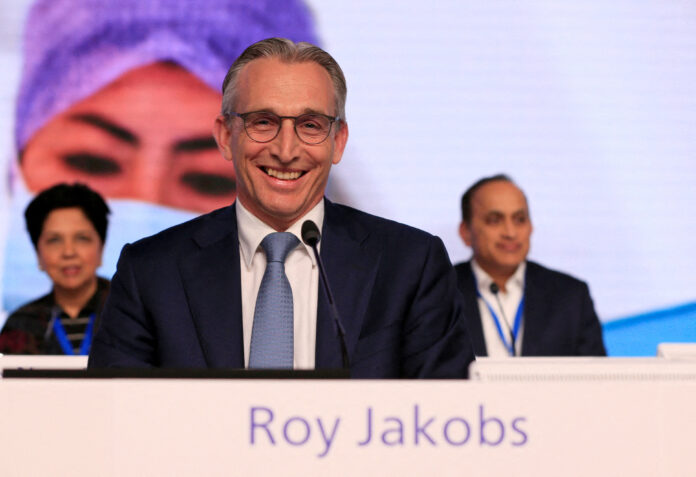Philips CEO Roy Jakobs attends Annual Shareholders Assembly in Amsterdam, Netherlands, Would possibly 9, 2023. REUTERS/Eva Plevier/Document Photograph Achieve Licensing Rights
AMSTERDAM, Oct 19 (Reuters) – Making extra merchandise for China in the community and purchasing chips from a number of providers are simply two of the provision chain adjustments Dutch healthcare era company Philips is making because of emerging business tensions, its CEO Roy Jakobs instructed Reuters.
The corporate intends to be sure that 90% of goods for the Chinese language marketplace are sourced and assembled in China by way of 2024 – up from 75% at the present and 48% in 2022.
Following pc chip shortages all over the COVID-19 pandemic that hit earnings, the corporate may be converting the way it procures tailored chips that move into its CT scanners and ultrasound machines. It now favours more recent however costlier chips to make sure they’re to be had from a number of places in a pinch.
Those developments imply worth will increase, however now not margin sacrifices, Jakobs stated in an interview.
“Prior to we had been all in quest of the optimum world provide chain potency,” he stated. Now “you wish to have to supply, manufacture and ship a lot nearer in your finish markets” despite the fact that that implies upper prices.
Jakobs took the highest process at Philips in 2022 amid a big recall of sleep apnea and respiration gadgets. He says managing the recall and its pricey aftermath stay his most sensible precedence.
However “additionally it is vital that I be certain that the remainder of Philips does smartly,” he stated. Stocks are up 31% in 2023.
China, the place Philips has operated for 100 years and is referred to as “Philipu”, is the corporate’s second-largest nationwide marketplace after the U.S., accounting for approximately 13-15% of income with 8,000 workers and 5 manufacturing websites.
Philips’ China trade boomed prior to the pandemic, however that pattern is slowing, Jakobs stated. Extra modest long run expansion will come from China’s expanding reliance on healthcare era as its group of workers shrinks and ages.
Whilst Germany has referred to as on firms to “derisk” from China, Netherlands-based Philips will proceed to supply Chinese language parts together with nuts, bolts, plastics, electronics, screens and different semi-finished items for its operations around the globe.
“The smaller you move in portions, the extra it’s going to get it popping out of China,” he stated. “2d, 3rd, fourth tier providers in China do so much for the entire international …(realistically) there can be a undeniable steady dependency on China”.
However “the upper you move up within the worth chain, the extra you’ll have to cater to native (nationwide) necessities,” he stated.
Reporting by way of Toby Sterling; Enhancing by way of Sharon Singleton
Our Requirements: The Thomson Reuters Accept as true with Ideas.





 #shorts #shortsfeed #nature #youtubeshorts #iciness
#shorts #shortsfeed #nature #youtubeshorts #iciness